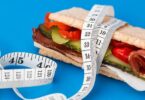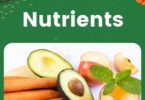Pregnancy is a beautiful and exciting time, but comes with challenges and responsibilities. One of them is making sure that you and your baby get the best ideal nutrition possible. Eating well during pregnancy can help you feel good, prevent joint problems, and support your baby’s growth and development.
But what exactly is the ideal nutrition for pregnancy? How much and what should you eat? What foods should you avoid or limit? How can you make healthy choices without spending too much time or money? This blog post will answer these questions and more based on the latest scientific evidence and expert recommendations.
Why The Ideal Nutrition Matters During Pregnancy
The Ideal Nutrition is important for everyone, but especially for pregnant women. Your body needs more energy, protein, vitamins, minerals, and fluids to support the changes inside you and nourish your growing baby. Eating well can also help you cope with some of the common symptoms of pregnancy, such as nausea, constipation, fatigue, and cravings.

Moreover, ideal nutrition can have a lasting impact on your baby’s health and well-being. Research shows that what you eat during pregnancy can affect your baby’s brain development, birth weight, immune system, and risk of chronic diseases later in life. Therefore, eating well during pregnancy is good for you and your baby’s future.
How Much Should You Eat During Pregnancy
One of the most common questions pregnant women have is how much they should eat. The answer is different for everyone, depending on your pre-pregnancy weight, height, age, activity level, and health status. However, a general guideline is that you need about 300 extra calories daily during the second and third trimesters of pregnancy. This is equivalent to a slice of whole-wheat bread with peanut butter, a banana, or a cup of low-fat yoghurt with granola and berries.
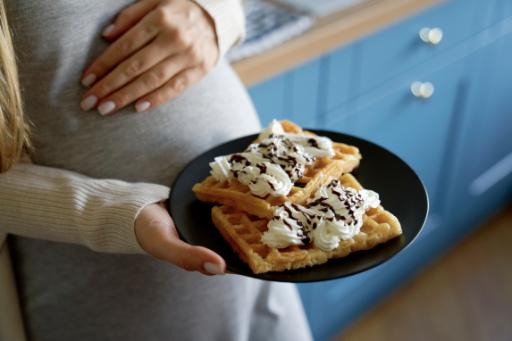
However, this does not mean that you should eat twice as much as before or that you can eat whatever you want. The quality of your calories is more important than the quantity. You should choose foods rich in nutrients and avoid foods high in fat, sugar, and salt. You should also focus on your hunger and fullness cues and avoid overeating or skipping meals.
What Should You Eat During Pregnancy
The best way to get the nutrients you and your baby need is to eat a balanced and varied diet that includes all food groups: vegetables, fruits, grains, dairy, and protein. Here are some examples of foods that are beneficial for pregnancy and how much you should eat from each group:
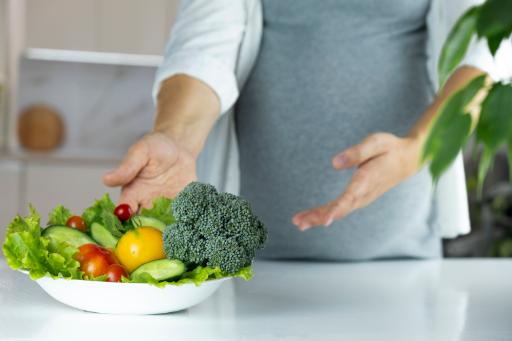
- Vegetables: They provide fibre, vitamins, minerals, and antioxidants that can help prevent constipation, infections, and inflammation. You should eat at least 2 1/2 cups of vegetables daily, preferably of different colours and types. Some of the best choices are carrots, sweet potatoes, pumpkin, spinach, cooked greens, tomatoes, and red sweet peppers, as they are high in vitamin A and potassium.
- Fruits: They provide fibre, vitamins, minerals, and antioxidants that can help prevent constipation, infections, and inflammation. You should eat at least 2 cups of fruits daily, preferably fresh, frozen, or canned without added sugar. Some of the best choices are cantaloupe, honeydew, mangoes, prunes, bananas, apricots, oranges, and red or pink grapefruit, as they are high in potassium.
- Grains: They provide carbohydrates, fibre, iron, and folic acid to help provide energy, prevent anaemia, and prevent neural tube defects in your baby. You should eat at least 6 ounces of grains daily, preferably whole grains that have not been refined or processed. Some of the best choices are oatmeal, brown rice, quinoa, whole-wheat bread, and fortified cereals high in iron and folic acid.
- Dairy: They provide calcium, protein, vitamin D, and potassium to help build and maintain strong bones and teeth for you and your baby. You should eat at least 3 cups of dairy daily, preferably low-fat or fat-free. Some of the best choices are milk, yoghurt, cheese, and calcium-fortified plant milk, such as soy, almond, or oat.
- Protein: They provide protein, iron, zinc, and omega-3 fatty acids to help build and repair tissues, support blood production, and promote brain and eye development. You should eat at least 5 1/2 ounces of protein daily, preferably lean and varied. The best choices are beans and peas, nuts and seeds, lean beef, lamb and pork, chicken, fish, eggs, tofu, legumes, and nuts.
What Should You Avoid or Limit During Pregnancy
While most foods are safe and healthy to eat during pregnancy, there are some that you should avoid or limit, as they can pose a risk of infection, contamination, or harm to you or your baby. Here are some examples of foods that you should avoid or limit during pregnancy:
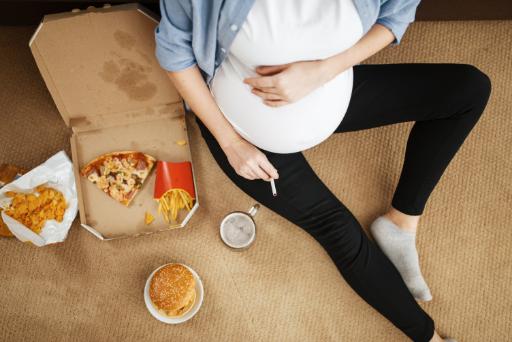
- Unpasteurized milk and foods made with unpasteurized milk can contain harmful bacteria, such as listeria, that can cause severe illness or miscarriage. It would help if you avoided soft cheeses, such as feta, queso blanco and fresco, Camembert, brie, or blue-veined cheeses unless they are labelled as made with pasteurized milk.
- Hot dogs and luncheon meats can also contain harmful bacteria, such as listeria, that can cause severe illness or miscarriage. You should avoid eating them unless they are heated until steaming hot before serving.
- Raw and undercooked seafood, eggs, and meat: They can contain harmful bacteria, parasites, or viruses, such as salmonella, toxoplasma, or hepatitis A, that can cause severe illness or congenital disabilities. You should avoid eating sushi made with raw fish, oysters, clams, mussels, raw or runny eggs, or rare or raw meat.
- Refrigerated pâté and meat spreads: They can also contain harmful bacteria, such as listeria, that can cause severe illness or miscarriage. You should avoid eating them unless they are canned or shelf-stable.
- Refrigerated smoked seafood: They can also contain harmful bacteria, such as listeria, that can cause severe illness or miscarriage. You should only eat them if they are canned, shelf-stable, or cooked in a dish.
- Alcohol: It can cross the placenta and affect your baby’s brain development, growth, and behaviour. It can also increase the risk of miscarriage, stillbirth, and fetal alcohol spectrum disorders. You should avoid drinking any amount of alcohol during pregnancy, as there is no safe level or time for alcohol consumption.
- Caffeine: It can cross the placenta and affect your baby’s heart rate, sleep, and growth. It can also increase the risk of miscarriage, low birth weight, and preterm birth. You should limit your caffeine intake to no more than 200 milligrams per day, equivalent to about one 12-ounce cup of coffee. You should also be aware of the caffeine content in other sources, such as tea, energy drinks, chocolate, and some medications.
- Artificial sweeteners: They are generally considered safe to use during pregnancy, but some of them may have unknown or long-term effects on your baby’s health. You should limit your intake of artificial sweeteners to moderate amounts and choose natural sweeteners, such as honey, maple syrup, or fruit juice, whenever possible.
How to Make Healthy Choices During Pregnancy
Eating well during pregnancy does not have to be complicated or expensive. Here are some tips to help you make healthy choices during pregnancy:
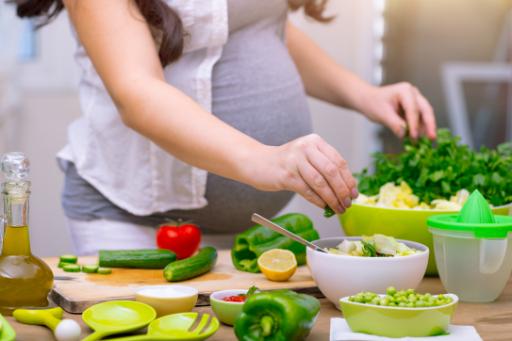
- Plan ahead: Planning your meals and snacks ahead of time can help you save time, money, and stress. You can use online tools, such as MyPlate, to create a personalized eating plan based on your needs and preferences. You can also make a shopping list, check the nutrition labels, and compare prices before you go to the store. You can also cook in bulk and freeze the leftovers for later use.
- Eat regularly: Eating regularly can help you avoid hunger, cravings, and overeating. You should aim to eat three balanced meals and two to three healthy snacks per day, spaced about three to four hours apart. You should also drink plenty of water and other fluids, such as milk, juice, or herbal tea, to stay hydrated and prevent constipation.
- Eat mindfully: Eating can help you enjoy your food, listen to your body, and control your portions. You should eat slowly, chew well, and pay attention to your food’s taste, texture, and aroma. You should also avoid distractions, such as TV, phone, or computer while eating. You should stop eating when you feel full and not when your plate is empty.
- Eat diversely: Eating diversely can help you get a variety of nutrients and flavours and prevent boredom and monotony. You should try to eat different foods from each food group every day and experiment with new recipes, cuisines, and ingredients. You should also eat foods from different cultures and regions, as long as they are safe and healthy for pregnancy. You can also ask your doctor or dietitian for advice on how to adapt your diet to your specific needs and preferences.
- Eat moderately: Eating moderately can help you avoid excess weight gain, which can cause complications during pregnancy and delivery. You should follow the recommended weight gain guidelines based on your pre-pregnancy BMI, which you can calculate using this formula: weight in kilograms divided by height in meters squared. The general ranges are as follows:
- Underweight (BMI less than 18.5): 28 to 40 pounds
- Normal weight (BMI 18.5 to 24.9): 25 to 35 pounds
- Overweight (BMI 25 to 29.9): 15 to 25 pounds
- Obese (BMI 30 or more): 11 to 20 pounds
You should also monitor your weight gain throughout your pregnancy and adjust your intake and activity accordingly. You can use online tools, such as [this one], to track your progress and get feedback.
- Eat safely: Eating safely can help you avoid food poisoning, which can be dangerous for you and your baby. You should follow these basic food safety rules:
- Wash your hands, utensils, and surfaces before and after handling food
- Separate raw and cooked foods and use different cutting boards and knives for each
- Cook foods to the proper temperature and use a food thermometer to check
- Refrigerate or freeze foods promptly, and discard any leftovers that are more than three days old
- Avoid cross-contamination, and do not reuse marinades or sauces that have touched raw foods
Conclusion
Eating well during pregnancy is one of the best things that you can do for yourself and your baby. By following the tips and guidelines that we have shared in this blog post, you can ensure that you get the ideal nutrition for pregnancy. Remember, you are not alone in this journey, and you can always seek help and support from your doctor, dietitian, family, and friends. We wish you a happy and healthy pregnancy!



